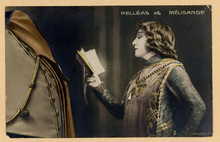Allemonde
| Pelléas and Mélisande | |
|---|---|

Sarah Bernhardt in Pelléas et Mélisande
|
|
| Written by | Maurice Maeterlinck |
| Characters |
Arkël, king of Allemonde Geneviève, mother of Pelléas and Golaud Pelléas, grandson of Arkël Golaud, grandson of Arkël Mélisande Little Yniold, son of Golaud (by a former marriage) Physician Porter Servants Beggars |
| Date premiered | 17 May 1893 |
| Genre | Symbolism |
Pelléas and Mélisande (French: Pelléas et Mélisande) is a Symbolist play by Maurice Maeterlinck about the forbidden, doomed love of the title characters. It was first performed in 1893.
The work was very popular. It was adapted as an opera by the composer Claude Debussy, and it inspired other contemporary composers, for instance, Gabriel Fauré, Arnold Schoenberg, and Jean Sibelius.
Golaud finds Mélisande by a stream in the woods. She has lost her crown in the water but does not wish to retrieve it. They marry, and she instantly wins the favor of Arkël, Golaud's grandfather and king of Allemonde, who is ill. She falls in love with Pelléas, Golaud's brother. They meet by the fountain, where Mélisande loses her wedding ring. Golaud grows suspicious of the lovers, has his son Yniold spy on them, and discovers them caressing, whereupon he kills Pelléas and wounds Mélisande. She later dies after giving birth to an abnormally small girl.
The main theme is the cycle of creation and destruction. Pelléas and Mélisande form a bond of love, which, step by step, cascades to its fatal end. Maeterlinck had studied Pythagorean metaphysics and believed that human action was guided by Eros (love/sterility) and Anteros (revenge/chaos). The juxtaposition of these two forces brings about a never-ending cycle of calm followed by discord and then change. Pelléas and Mélisande are so much in love that they disregard the value of marriage, provoking the ire of Anteros, who brings revenge and death, which restores order.
Several factors indicate the initial reign of Eros in the play. There is a famine in Arkël's kingdom, indicating that the time for change is nigh. The servants complain that they cannot thoroughly wash the dirt from the steps of the castle.
Water is a key element in the play. It appears in several forms throughout the work: Golaud finds her by a stream, Mélisande arrived in the kingdom by sea, she loses her wedding ring in a fountain, Golaud and Pelléas discover foul-smelling waters under Arkël's castle, Mélisande is often seen crying and mentions her tears several times. Moreover, most of the characters' names contain liquid consonants: Pelléas, Mélisande, Arkël, Golaud, Yniold. She appears to be related to the mythical figure Melusine in French folklore.
...
Wikipedia
